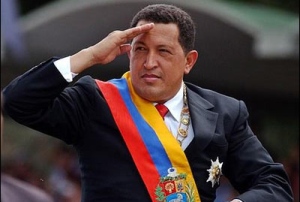Stoned on Chávez
The Oliver Stone documentary on Hugo Chavez is reminiscent of a Nazi or Soviet propaganda film.What is it about terrorist supporting, drug smuggling, oppressive dictators that the left so dearly loves?
By Roger Aronoff at AIM
“Venezuelans oppose Chávez attempt to nationalize private food company” is the headline over a Washington Post story about the disastrous socialist economic policies of Hugo Chávez in Venezuela. The article is about the employees of the company who “oppose the government intervention because they think workers have fared badly at nationalized companies, where they have faced reduced wages and been unable to bargain collectively.”
These kinds of stories are appearing more frequently, as it is getting tough for the media to ignore the popular opposition to the Marxist Chávez regime. This is why it is so bizarre for Hollywood director Oliver Stone to be releasing his pro-Chávez documentary at this time and speaking utter nonsense about the would-be dictator on programs such as CNN’s Larry King Live.
As AIM editor Cliff Kincaid reported in a recent column, Chávez’s policies are so atrocious, in the realm of economics and human rights, that the Socialist International (SI) has seen fit to denounce him. The SI reports that Chávez is mismanaging the economy, destroying human rights, and threatening peace in the region.
In perhaps the most blatant indication of how badly things are going in Venezuela, the oil-rich nation is suffering rotting food in warehouses and the government is staging raids to seize food supplies that are not rotting. It is more evidence of how “21st Century Socialism,” as Chávez calls it, is proving to be just as much of a failure as the older version. Sector after sector is being taken over and devastated by the incompetent and/or corrupt Chávez regime.
But thanks to the media, some of the truth is starting to get out!
Last month Reuters had a devastating piece about the deteriorating situation in Chávez’s modern Venezuela: “Mountains of rotting food found at a government warehouse, soaring prices and soldiers raiding wholesalers accused of hoarding: Food supply is the latest battle in President Hugo Chávez’s socialist revolution.” It points out that in oil-rich Venezuela, food prices have increased by 41% in the past year, during an already deep recession.
But Oliver Stone makes the rounds of American TV, sounding, well, stoned on Chávez.
However, despite his many media appearances, the public reaction here has not been overwhelming. Cliff watched the film in Virginia in a movie house that had seats for 300 but only 15 people showed up. When I saw it in the same theater, there were a total of six people.
U.S. Media Wake Up
The real surprise has been the critical reporting that is being seen more regularly in the major media. The New York Times went so far as to run an article documenting some of the misinformation about Venezuela found in Stone’s “documentary.”
The Chávez campaign against the media is a logical topic. This is where, of course, we would expect some coverage. After all, American reporters should naturally have some sympathy for their colleagues “South of the Border,” which is the name of the Stone film.
But in Stone’s film, reporters here and abroad who report critically about Chávez are the villains. Stone attacks Fox News almost as much as he does the Venezuelan media.
The situation under Chávez is dire. The Wall Street Journal recently reported that “The principal owner of Venezuela’s last remaining opposition television station has fled the country, as President Hugo Chávez continues to ratchet up the pressure on his rivals months ahead of crucial September legislative elections.” This is part of a pattern carried out by Chávez to help stay in power.
The article said that Guillermo Zuloaga, the principal owner of Globovision, was arrested last March “for saying on a television show that the nation lacked freedom of expression. But he was released after an international outcry.”
In recent years, Chávez “has moved to take over the airwaves, opening a plethora of state-run channels that give the president fawning coverage.” He forced the biggest and most outspoken broadcaster, RCTV off the air and off the cable systems by not renewing its license.
“Other TV broadcasters, cowed by the government, softened their coverage of the government,” according to the Journal. “But Globovision has remained the exception, infuriating Chávez officials.”
FULL STORY
Help Make A Difference By Sharing These Articles On Facebook, Twitter And Elsewhere:
